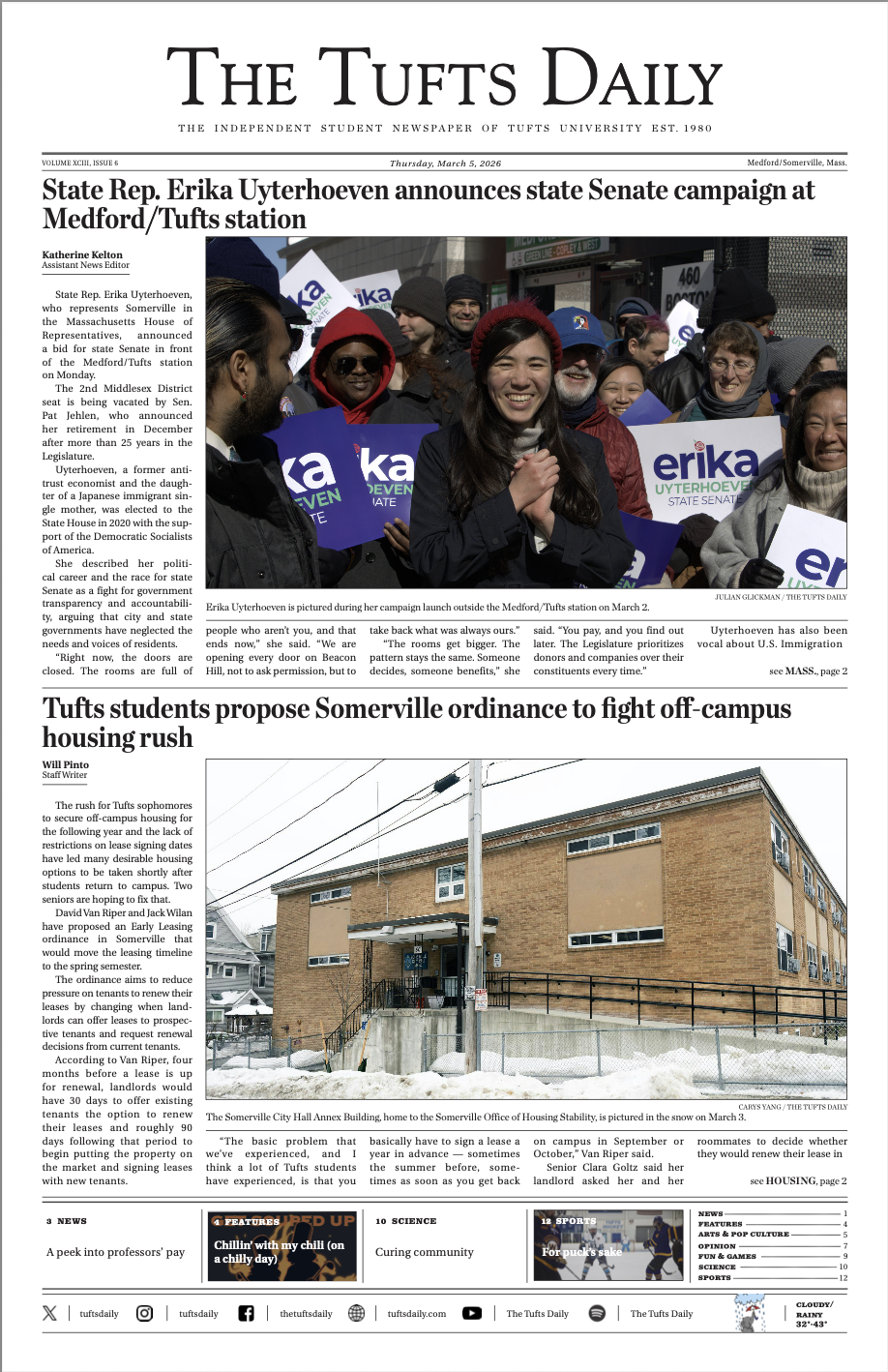Kristy Meadows, a graduate of Tufts University’s Cummings School of Veterinary Medicine, has filed a $1 million lawsuit against the school. Meadows claimed in a legal complaint obtained by the Daily that she faced retaliation after she reported a member of her department, Professor of Biomedical Science Elizabeth Byrnes, for allegedly fabricating research, as well as alleged animal abuse.
The lawsuit's title lists Tufts University, Byrnes and former Dean of the Cummings School ad interim Joyce Knoll as defendants.
Based in Grafton, Mass., Byrnes is a researcher within Tufts' Sackler School of Biomedical Sciences, which has come under scrutiny by the Tufts community and Massachusetts Attorney General Maura Healey's office for its relationship to Purdue Pharma and the Sackler family, according to a Daily investigation published last spring.
Byrnes' lab focuses on research in opioid use as well as neural changes that contribute to depression after a stroke.
According to the complaint, Byrnes' research was funded by the National Institutes of Health (NIH) and supported by the U.S. Army; her published work corroborates this.
According to her lawsuit, Meadows knew she wanted to become a veterinarian at age 24, when her cat was diagnosed with a neurological disorder. She enrolled as a Doctor of Veterinary Medicine (DVM) student at the Cummings School in the fall of 2010 and began the masters program in Tufts University’s Comparative Biomedical Sciences program in 2012. She enrolled in the Ph.D program in 2013.
Meadows was awarded multiple scholarships, such as the Merck Animal Health Veterinary Student scholarship, which is an effort by American Veterinary Medical Foundation to support "exceptional veterinary students," as well as the Henry L. Foster, DVM scholarship, which is given to students at the Cummings School who “excel academically and demonstrate leadership.”
She graduated fourth in her class with a cumulative grade point average of 3.86, according to the lawsuit. Meadows obtained a Ph.D from Tufts in biomedical sciences with a concentration in neuroscience in 2017, and her DVM in veterinary medicine in 2018.
Meadows solicited David A. Russcol and Rachel Stroup, with the firm Zalkind Duncan & Bernstein LLP in Boston, to represent her in court against Tufts.
Meadows' complaint places particular emphasis on the disparity between her academic achievement and her success entering the workforce after college.
"[Meadows] has not found a long-term position or any opportunities involving research or academia," the lawsuit says.
The complaint goes on to list several instances in which Meadows believes she experienced retaliation, including accusations of theft anddiscontinuing a stipend Meadows had received.
"[Meadows] has suffered substantial damages as a direct and proximate result of Tufts’ actions and inactions, including reputational harm, delayed or lost career opportunities, lost earning potential, emotional distress, and other consequential damages," the lawsuit says.
Meadows began working with Byrnes, her former advisor, in 2012. According to her lawsuit, Meadows worked in Byrnes’ lab.
“[Meadows] conducted research on animals and studied brain sexual dimorphism as it relates to hormones and stress, as well as sex differences and hormonal alterations in the brain as a result of ischemic stroke,” the lawsuit says.
In December 2013, Meadows and Byrnes organized their research into an article entitled “Sex- and age-specific differences in relaxin family peptide receptor expression within the hippocampus and amygdala in rats,” which was funded by the NIH. In August 2014, however, Meadows claimed that she discovered fabricated data from an experiment she said the lab never performed.
The lawsuit says that when Meadows asked Byrnes about her findings, Brynes allegedly told Meadows that the data would have reflected their findings if they had conducted the experiment.
“Dr. Byrnes did not deny fabricating the data for an experiment that had not been conducted,” the lawsuit says.
The article was published in the journal Neuroscience in October 2014.
Meadows’ lawsuit claims that she initially hoped to resolve the issue in an informal manner. By 2016, however, her lawsuit states it became apparent that Byrnes did not plan to correct any purported misinformation. Meadows voiced her concerns about the falsified data to multiple members of Tufts faculty.
The lawsuit says Meadows reported the fabrication to Kirby Johnson, director of research integrity with the office of the vice provost for research, on April 7, 2016. According to the lawsuit, by July 1, a fact-finder hired to investigate Meadows' claim found it was credible enough to warrant further investigation.
Following her meetings with Tufts administrators, the lawsuit says, Meadows alleges that she faced multiple retaliatory attacks from Byrnes, including the discontinuation of her stipend for her work in the lab and Byrnes telling other faculty that Meadows was a "bad student and not getting her work done."
In addition, according to the lawsuit, Meadows was set to defend her thesis by July or August of 2016, but was notified on July 20 that her thesis defense would be delayed until the provost's investigation was complete.
From her initial meetings with faculty in 2015 through 2019, Meadows claims she was subject to retaliation from Byrnes and other Tufts faculty, which harmed her reputation. Knoll allegedly exacerbated this harm.
“[Meadows] was punished for speaking up while the University failed to protect her … Her graduation was delayed, her research was impeded, her reputation severely damaged, and her career opportunities curtailed. Tufts swept her allegations under the rug and allowed this retaliation to occur for years,” Russcol, Meadows’ attorney, told the Daily in an email.
Meadows could not be reached for comment.
The lawsuit also accuses Knoll and the Cummings School of damaging Meadow's reputation through an email. The lawsuit claims that the entire Cummings School and some alumni could have received an email that appears to have been sent to the wrong recipients, which references a person named Kristy in the neurology department who might "sue us." The email also refers to Byrnes.
"I don’t know what the neurologists here thought of Kristy. I know at least one of our pathologist[s] thought she was antisocial and weird," Knoll's email said.
Knoll's reaction to the email, which was also sent to at least a portion of the Cummings student email list and was obtained by the Daily, seems to confirm this.
"I totally screwed up and sent a message to the Grafton campus and our students that I meant to go to our lawyer," Knoll said in an email intended for Tufts Technology Services.
The lawsuit claims that this email, by being sent to many people, could damage Meadows' career path in the future.
In the second half of the email, Knoll questioned the legal implications of a potential lawsuit, asking if recommendations by professors could be used as legal evidence.
"[I]f she got bad recommendations from people at Tufts in the hospital, that are not linked to Liz Byrnes, can she hold that against us? Can she require that everyone here give her a good evaluation even if it’s not deserved?” the email said.
Meadows said that she received this email and several people contacted her to alert her about the email, according to the lawsuit. The lawsuit alleges that the distribution of this email "compounded and magnified the harm to Dr. Meadows’ reputation and career."
The lawsuit also alleges that Knoll urged multiple professors to conduct research with someone other than Meadows, resulting in lost research opportunities.
"On information and belief, in or around May 2017, Dr. Knoll again suggested to Dr. Ayres that she choose a student other than Dr. Meadows to help her with her research, because Dr. Byrnes had advised Dr. Knoll that there was evidence that Dr. Meadows stole data from Dr. Byrnes’ lab," the lawsuit says.
Executive Director of Public Relations Patrick Collins could not comment on the lawsuit.
“Tufts University does not comment on pending litigation. We look forward to responding to the lawsuit in court,” Collins told the Daily in an email. "The university is committed to research integrity and to providing a safe and supportive learning and work environment for all members of its community – values which it takes very seriously.”
According to Collins, the university has until late October to respond to the lawsuit, though could be granted extensions by the court.
More from The Tufts Daily





